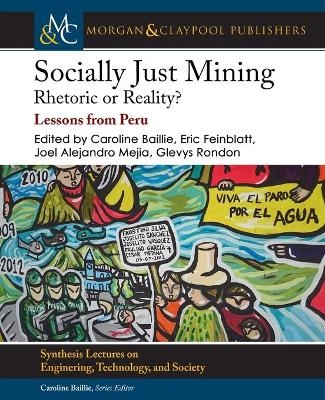
Socially Just Mining
Morgan & Claypool Publishers (Verlag)
978-1-68173-929-8 (ISBN)
In this book we consider ways in which mining companies do and can/should respect the human rights of communities affected by mining operations. We examine what "can and should" means and to whom, in a variety of mostly Peruvian contexts, and how engineers engage in "normative" practices that may interfere with the communities' best interests. We hope to raise awareness of the complexity of issues at stake and begin the necessary process of critique—of self and of the industry in which an engineer chooses to work. This book aims to alert engineering students to the price paid not only by vulnerable communities but also by the natural environment when mining companies engage in irresponsible and, often, illegal mining practices. If mining is to be in our future, and if we are to have a future which is sustainable, engineering students must learn to mine and support mining, in new ways—ways which are fairer, more equitable, and cleaner than today.
Caroline Baillie is Professor of Praxis in Engineering and Social justice at the University of San Diego, and co-founding director of the not-for-profit ""Waste for Life"" (wasteforlife.org) which supports vulnerable communities in the development of upcycled waste-based businesses. Baillie's research considers socio-technical processes and systems, which enhance social and environmental justice, and educational systems that promote these. She brings lessons learned from these studies and practices into the classroom of all ages, to facilitate the transformation to a more equitable and just future. Professor Baillie has published 27 scholarly books, over 200 book chapters, peer reviewed journal and conference papers, and is Editor of this book series Engineers, Technology, and Society. Eric Feinblatt was the visual and audio documentary investigator of the IM4DC funded research project in Peru and the Forum for Mining and social justice held meeting at Casa Pueblo in Puerto Rico discused in this publication. Two of his video interviews with Maxima Chaupe and family in Cajamarca and Melchora Suco Dimache in Espinar are described and appear as links in this book. His work about the community impacts of mining were used as evidence in support of these human rights defenders. Mr. Feinblatt is co-founder, along with Caroline Baillie, and Director of Waste for Life, a U.S.-based non-for-profit organization. Joel Alejandro Mejia is an assistant professor in the Department of Integrated Engineering at the University of San Diego. He worked as a metallurgical and project engineer for Rio Tinto and FLSmidth on different projects around the world, including mining operations in Peru, Mexico, and Zambia. His current research has contributed to the integration of critical theoretical frameworks and Chicano Cultural Studies to investigate and analyze existing deficit models in engineering education, and the development of critical consciousness among engineers. Dr. Mejia's work, influenced by his previous work as a metallurgical engineer, also examines how asset-based models impact the validation and recognition of students and communities of color as holders and creators of knowledge. His work seeks to analyze and describe the tensions, contradictions, and cultural collisions many Latinx students' experience in engineering through testimonios. He is particularly interested in approaches that contribute to a more expansive understanding of engineering in sociocultural contexts, the impact of critical consciousness in engineering practice, and development and implementation of culturally responsive pedagogies in engineering education. Glevys Rondon worked for over two decades as director and founder at the Latin American American Mining Monitoring Programme (LAMMP), a London-based organization aiming to empower and improve the lives of women affected by mining in rural Latin America. She is an independent researcher and consultant with expertise in rights, gender, and corporate accountability, particularly in relation to land and natural resources. Jordan Aitken graduated from the University of Western Australia in 2016 with Bachelors' degrees in law and mining engineering. During the course of his studies, Jordan discovered a passion for international law. It was the confluence of international law and mining operations in particular, their impact on surrounding communities that formed the basis of his chapter in this book, which was authored during his final year of study. Since graduating, Jordan has worked in several roles across government, including in foreign affairs as an international lawyer, and more recently as an adviser to the Minister Assisting the Minister for Trade and Investment. Rita Armstrong is an anthropologist whose postgraduate research was based on fieldwork in Central Borneo. She has since worked as a researcher on an ""Engineering Education for Social and Environmental Justice"" project with Caroline Baillie, and has also taught across the disciplines of Engineering, Anthropology, and Geography around the issues of environment, conservation, gender, and development. Vicki Bilro completed a Bachelor of Environmental Engineering and then a Master's in Civil Engineering where her thesis topic investigated the impact of mining on rural communities in Peru. Following her studies, she is now working as a Site Engineer for a commercial construction company in Perth.
Acknowledgments
Introduction
Mines and Community Engagement in Peru: Communities Telling Their Stories to Improve Future Practice
The Ineffectiveness of Human Rights Protection Mechanisms for Communities Affected by Mining: A Case Study of Minas Conga in Cajamarca, Peru
Exploring the Notion of Socially Just Mining Through the Experiences of Five Indigenous Women from Latin America
Everyday Gender Violence in Peru in the Context of Extractive Operations
Access to Remedy for Indigenous Communities: A Case Study in Amazonian Peru
Translating Values into Action: What Can Be Done?
Authors' Biographies
| Erscheinungsdatum | 08.10.2020 |
|---|---|
| Reihe/Serie | Synthesis Lectures on Engineers, Technology, and Society |
| Verlagsort | San Rafael |
| Sprache | englisch |
| Maße | 191 x 235 mm |
| Themenwelt | Naturwissenschaften |
| Technik ► Bergbau | |
| Technik ► Umwelttechnik / Biotechnologie | |
| ISBN-10 | 1-68173-929-1 / 1681739291 |
| ISBN-13 | 978-1-68173-929-8 / 9781681739298 |
| Zustand | Neuware |
| Haben Sie eine Frage zum Produkt? |
aus dem Bereich


